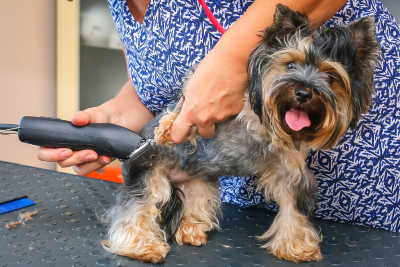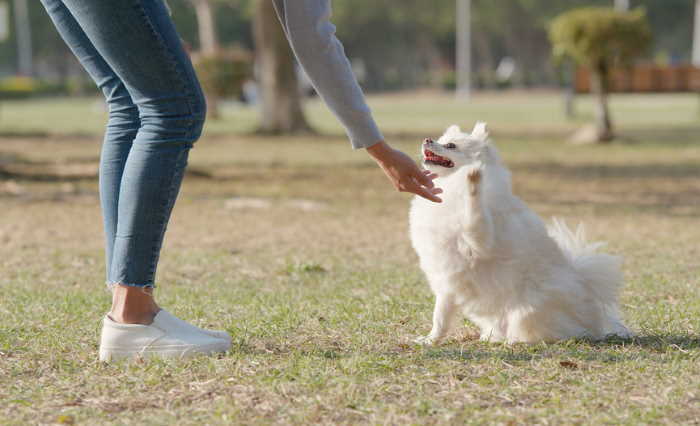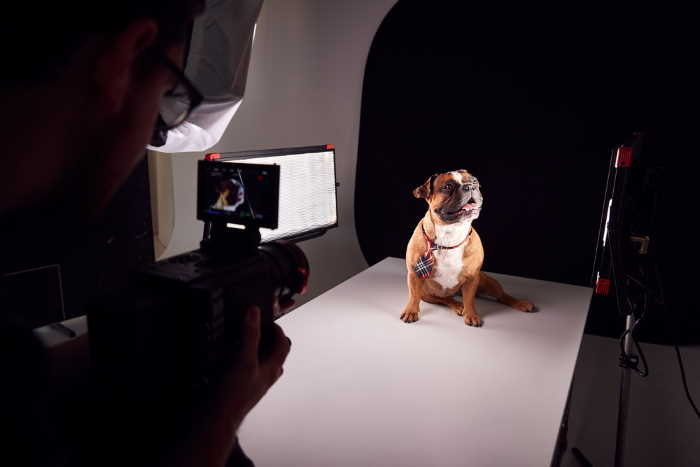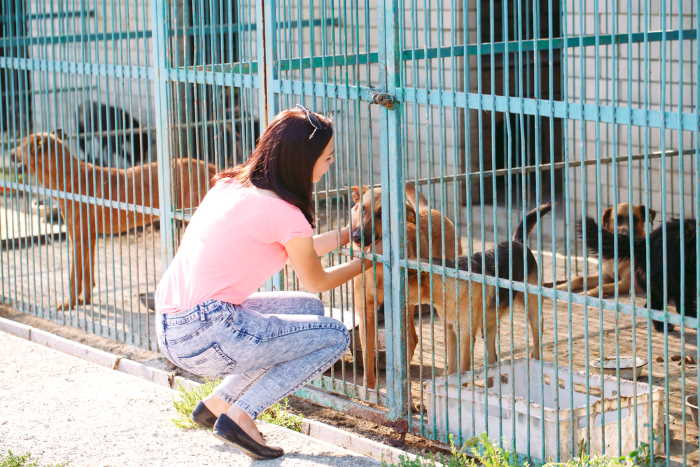- Small Dog Place Home
- Animal Related Careers
13 Jobs Working With Dogs: Consider These Career Options
Jobs Working With Dogs by Janice Jones
Following one's passion is no longer deemed flaky or irresponsible. Jobs that were once thought of as hobbies or in-between jobs, have made it into the respectable-professions list. Rightfully so.
If all you dream about is working with dogs, this is a great time to pursue that passion.
13 Jobs Working With Dogs
Here is a list of some excellent dog-centered careers for your consideration.
1. Dog Groomer
 Jobs Working With Dogs: Groomer
Jobs Working With Dogs: GroomerAs a dog groomer, you will primp poodles, coif cocker spaniels, and basically make your furry clients feel and look beautiful.
Before you set out on your own, consider working under a professional dog groomer for a while to sharpen your skills. Better yet, enroll in a grooming school program.
Be sure to keep up with industry trends through reading dog grooming magazines and blogs. You need to consistently wow your clients and their owners for them to be loyal clients.
Skills need for success in this industry include patience, good communication, good eye-hand coordination, ability to manage difficult dogs, good business skills, and excellent grooming techniques. It is also necessary to have a good understanding of different dog breeds, and basic animal anatomy.
2. Animal Behavior Consultant
These professionals work with dogs and their owners to identify the causes of bad behavior and remedy them. Much like a psychologist, only for dogs.
Applied animal behaviorists prescribe behavior modification, training, and desensitization to solve behavioral problems.
Veterinary behaviorists, on the other hand, work just as animal behaviorists do. However, they can also diagnose and prescribe medication for animals.
Both professions require rigorous formal training and certification before one can be licensed to practice.
3. Dog Trainers
 Jobs Working With Dogs: Trainer
Jobs Working With Dogs: TrainerDog trainers understand dog behavior and work with dogs and their owners to teach them basic and advanced commands.
This helps dogs have a better relationship with their owners and other members of the household.
Trainers can also train work dogs and showbiz dogs to perform as required for movies and TV shows. Others may specialize in training dogs for the various dog sports such as agility and earthdog trials.
While there is no specific training or certification required, dog trainers must be extremely patient and kind with people, as they work closely with dog owners.
Many of the best trainers, though, have gone through some type of training and earned certifications.
Before starting out, it is prudent to work under an experienced trainer to have a solid understanding of the trade before jumping into it. According to the U.S. Bureau of Labor Statistics, the mean hourly wage for trainers is $17.43 with a mean annual income of $36,240.
4. Dog Restaurant Owner
If you can't seem to get enough of watching dogs slurping up their meals, tails wagging and eyes open with excitement, this might just be the job for you.
As a dog restaurant owner or dog treat bakery, you will be tasked with making delicious, healthy dog meals, serving them, and even delivering them where your clients live.
Your clients will be dog owners who want to feed their cherished friends with something better than store-bought, preserved dog food, and treats.
This means that you have to deliver tasty dog food made with fresh ingredients.
This is an excellent job if you love dogs and enjoy cooking or baking. It is labor-intensive, so expect to work hard. The best opportunities for this type of business are in larger cities where delivery time is manageable.
The good news is that you will be able to make a decent income, depending on the size of your business. The bad news is that you may need to hire employees, so part of your time will be taken up by business-type tasks.
5. Dog Breeder
 Jobs working with Dogs: Breeder
Jobs working with Dogs: BreederOne does not go to school to become a dog breeder, yet there is a steep learning curve when it comes to the amount of knowledge to be a responsible and ethical dog breeder. Most people go into this field first as a hobby and then gravitate to the business end.
Breeders must love dogs, especially one or two breeds, and have considerable knowledge of those chosen breeds, including the physical characteristics, background genetics, health, grooming, and training that is best for their favorite breed.
It is not a 9 to 5 Monday to Friday sort of position, instead, at times, dog breeders are "on the clock" upwards of 24 hours at a stretch. Income can be good, but it is sporadic. And, there is the possibility of financial loss, should something happen to the adults or the puppies.
As a business, a considerable amount of money is needed at first to purchase foundation stock, so it isn't one of those jobs that one can just decide to do one day and be successful the next.
The good news is that you can make good money if you do it right. The bad news is that you are never off duty. Dogs will always need you, whether it's a Sunday morning or 1 AM on a Tuesday morning.
6. Dog Walking, Dog Sitting
 Jobs working with Dogs: Walker
Jobs working with Dogs: WalkerThis is another option for dog owners who also prefer to be work for themselves. It is possible to make an excellent full time living doing this type of work. Others get into dog walking or dog sitting as a side gig and a way to make extra income.
As the name implies, dog walkers come to clients' homes and take their dog(s) for a walk. They may also feed and water the dogs, play with them, and administer medication. Most will also be responsible for cleaning up after the dog. Dog Walkers most work in large cities where dogs may live in condos or apartments, taking many dogs for a walk at the same time
Dog sitters may stay at the client's home overnight, caring for the pets, bringing in mail and a newspaper, and even watering plants. Not all sitters spend the night but may come several times a day to let dogs out, feed, and play with them. Both of these jobs are often performed by the same person.
Dog walkers and sitters love dogs and understand their behavior, but they also have excellent people skills. The ability to communicate is a must. As with dog breeders, this occupational choice has odd hours, and income may not always be predictable.
The good news is that you can make a full-time income if you work for yourself, and there is a certain amount of flexibility in the hours you keep. There is a better chance of making more money if you work for yourself as opposed to being associated with an organization. But, being associated with an organization may mean more work and more job possibilities
7. Retail Pet Store Personnel
 Jobs working with Dogs: Retail store
Jobs working with Dogs: Retail storeSalaries are low, and work hours may be long, but most retail pet store owners do not have a difficult time finding someone to work in their store. If you like retail work and enjoy being around animals, this may be an option or even an entry-level position while you go to college.
Most pet stores do not sell puppies or kittens these days, but there are still some that do. If you enjoy playing with, caring, and cleaning up after puppies, this might be a good option for you.
Many pet stores still sell fish, small reptiles, birds, and some small mammals such as guinea pigs and hamsters, all of which need care.
For the most part, though, working as a retail clerk in a pet store requires being able to communicate with clients, handle money, and stocking shelves. The good news is that you don't need a lot of experience and education. The bad news is the pay is relatively low.
8. Dog Writer, Dog Blogger
 Jobs working with dogs: Blogger
Jobs working with dogs: BloggerThe internet is bursting at the seams with websites devoted to dogs and other pets. Just google the word dogs, and you'll be likely to see more than 4 billion results pop up. That is a lot of websites!
Many are large sites owned by huge corporations; some are pet-related organizations, and still, others belong to a variety of different companies that cater to dogs in one way or another. So you may be asking, how does one make money online writing about dogs?
Well, this site is a testament to the possibilities that exist for individuals who want to make money blogging about their favorite dog.
Bloggers make money from a variety of sources, including ad income, affiliate sales, sponsored posts, and blogger created products. The good news is that you can make a full-time income from your blog. The bad news is that it takes time and effort.
There is no such thing as a get rich scheme that some sites would have you believe.
Most bloggers hone in their skills through online classes, networking, books, and other informal ways to learn the various parts of the job. The most essential qualities of good bloggers are passion, motivation, hard work, and the ability to write. You can read how I built this site from scratch with SBI
9. Crafting with Dogs in Mind
Do you love to craft? Love dogs? Many people with both of these passions combine them and make items dog lovers will want to own. You will find these loving dog crafters in many different venues, from dog shows and craft fairs to farmers' markets.
Some crafters make items and donate them to help with a cause such as a specific dog rescue or shelter project. The internet is the most logical place to sell dog-related merchandise.
Sites such as Etsy offer a location to set up a virtual store. You can also sell your products directly from your own website.
The most popular types of merchandise sold to dog lovers are jewelry, breed-specific clothing such as t-shirts and sweatshirts, small figurines or Christmas ornaments, and toys.
Handcrafted household items such as breed-specific pillows and blankets, paintings, and other forms of artwork.
Some crafters make items, especially for dogs such as high-end clothing, sweaters, or booties. Leather workers create one of a kind collars and leashes.
Some talented artisans create one-of-a-kind water bottle stands and handcrafted dog beds. Still, others who frequent dog shows will produce lovely show leads and hair bows adorned with high-end jewels.
The amount of money you can make in this field depends on how skilled you are, how in-demand your products are, and how much time you have to devote to your craft.
10. Dog Photographer
 Jobs working with dogs: Photographer
Jobs working with dogs: PhotographerIf you have an interest in photography, gravitating to shooting dogs is a logical path to take. Many people start out as a portrait photographer, but others learn the craft just to photograph dogs and other pets. Most of the work is freelance, but some studios hire photographers to work with dogs and their family members.
Photographers learn their craft through schools, colleges, and assisting professional photographers. Dog photography is different in that the photographer not only needs to be skillful in using camera equipment, framing shots but also dealing directly with dogs.
There is an art to dealing with dogs as anyone knows who has ever tried to photograph their own dogs. Individual personalities, lack of training, and short attention spans mean that photographing dogs are more challenging than say taking a photograph of a lovely landscape.
Professional photography equipment is expensive, so anyone interested in this field should consider the upfront costs of getting started.
Freelancing and selling photos online is one way to earn money. Many dog clubs will hire a professional photographer to take pictures of all the winners at shows.
Dog product brands also need excellent photographs to show off their brands. Creating a business around dog photography all depends on your skills and the number of hours you have to devote to your craft.
11. Kennel Assistant
 Jobs working with dogs: Kennel assistant
Jobs working with dogs: Kennel assistantShelters and Boarding kennels need assistants to help care for the animals. They spend their day cleaning, feeding, and watering pets in their care. They may also take dogs for walks, interact, and play with residents.
Jobs are available in dog daycare centers, boarding kennels, and shelters. Most jobs are entry-level, but if you have dreams of owning your own boarding kennels, this might be an excellent opportunity to get your feet wet.
Dog shelters often rely on volunteers to walk dogs, feed, clean and offer water to dogs in the shelter. Employees often are in a position of shelter management that includes coordinating volunteer efforts, clerical duties, and public outreach. Some shelters rely on employees to care for the animals by cleaning, disinfecting, feeding, and caring for the dogs that live there.
Salaries are low, especially for nonprofit organizations, but the experience that is offered through some of these jobs is a stepping stone to more lucrative careers. The Bureau of Labor Statistics reports that the mean hourly wage of $13.01 and annual salary of $27,060 for shelter workers.
12. Animal Control Personnel
Long gone are the days of the "dog-catcher." Animal control officers replace that outdated view and serve to protect the health and safety of people and animals.
An animal control officer investigates abuse and neglect cases and enforces animal welfare laws. They are responsible for rescuing stray animals and capturing and impounding dangerous animals.
They may be required to testify in court and write reports. They may also be called in to assist with euthanasia and in issuing civil fines to individuals who break animal welfare laws.
They may also be called in to help relocate wildlife that may have been displaced due to habitat loss. A high school diploma is required, but for many positions, a college degree is preferred, along with experience working as a police officer, animal technician, or shelter personnel.
Some states also require applicants to take a certification course before being considered for a position. The National Animal Care and Control Association is the place to go to get more information.
13. Veterinary Medicine – Veterinarians, Vet Techs, and Vet Assistants
 Jobs working with dogs: Veterinarian, Veterinary Technician, Veterinary Assistant
Jobs working with dogs: Veterinarian, Veterinary Technician, Veterinary AssistantVeterinary medicine promotes pet health and wellness and is a fast-paced and rapidly growing field. As one of the highest paying jobs working with dogs, it is worth considering if you love math and science and have a passion for dogs and other animals.
Veterinarians go through four years of undergraduate school and another four years of veterinary school to become doctors of veterinary medicine. You can also complete your residency to become a board-certified specialist.
Veterinary Technician or Veterinary Technologist
If many years of study are not your thing, consider becoming a veterinary technician. To practice, you will only be required to complete 2-4 years of school in a veterinary technician's program. A two-year college degree is necessary to become a technician, and a four-year degree is needed for a technologist. An examination and certification are also required for these positions.
Both Technicians and Technologists work side by side with veterinarians and the main difference revolves around the amount of schooling.
This job is akin to what lab technologists do for human patients; you will be tasked with the responsibility of observing specimens in the lab to check the presence of diseases.
They also assist in surgery, anesthesiology, care for hospitalized animals, and take and process X-rays. They may perform other tasks under the direction of a veterinarian, such as drawing blood, giving injections, and cleaning teeth. Many are also responsible for ordering supplies and managing the front desk and back-office personnel.
Vet technicians work very closely with dog owners and veterinarians to ensure the well-being of their patients. Vet technologists with a four year degree also have the option of continuing with their schooling and complete a master's degree. With this degree, they may end up working as a research assistant making more money,
Veterinary Assistant
A veterinary assistant does not require a degree, but there are college and diploma programs available that teach all the necessary skills that an assistant might need. Most learn on the job.
Veterinary assistants often work hand in hand with veterinarians during routine office visits, answer phones, and make appointments. They may also feed animals, clean cages and administer medications.
General knowledge of the practice, familiarity with computers and software, and excellent communication skills are necessary for this job.
Jobs Working with Dogs: Pin for Future Reference
About Janice (author and voice behind this site)
Having lived with dogs and cats most of her life, Janice served as a veterinary technician for ten years in Maryland and twelve years as a Shih Tzu dog breeder in Ohio.
Her education includes undergraduate degrees in Psychology with a minor in biology, Early Childhood Education, and Nursing, and a master's in Mental Health Counseling.
She is a lifelong learner, a dog lover, and passionate about the welfare of animals. Her favorite breed for over 50 years has been the Shih Tzu, but she has also lived with Poodles, Maltese, Yorkshire Terriers, Beagles, English Bulldogs, Carin Terriers, and a Cocker Spaniel.
When not writing, reading, and researching dog-related topics, she likes to spend time with her eight Shih Tzu dogs, husband, and family, as well as knitting and crocheting. She is also the voice behind Miracle Shih Tzu and Smart-Knit-Crocheting
Does This Article Deserve Your Thumbs Up?
We always appreciate your support and encouragement. Your thumbs up means so much to us. Please like this article.
If you find this page or any page on Small Dog Place Helpful, or useful in anyway, I'd love it if you would click the small heart found on the bottom right of each page.
You can also share or bookmark this page -- just click on the:

Free Monthly Newsletter
Sign Up for Our Free Newsletter and get our Free Gift to You.
my E-book, The Top 10 Mistakes People Make When Choosing a Dog (and how to avoid them)


